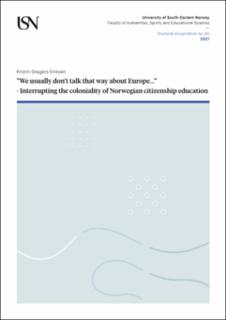”We usually don’t talk that way about Europe…” - Interrupting the coloniality of Norwegian citizenship education
Abstract
In this study, I explore the coloniality of Norwegian citizenship education, emphasizing
knowledge production and discourses in primary school classrooms. I investigate the
social justice of knowledge production and explore the possibilities, complexities, and
risks of critical interruptions to hegemonic epistemological frameworks. The emphasis on
coloniality engages analyses of how historical colonialism installed enduring
epistemological and material structures that continue to inform our current ways of
thinking and being. Coloniality encompass a system where the white majority represents
the invisible norm, acting as the bearer of the alleged universal rationality. The
significance of coloniality for citizenship education is related both to locating the possible
limitations posed by colonial frameworks of knowledge to the potential for fostering
critical thinking, and the reproduction of racialization and othering through educational
discourses. The purpose of this study is to contribute knowledge that can enable antiracist, decolonizing, and critical citizenship education practice.
This is an article-based dissertation, comprised of four scientific articles and a “kappe”,
or extended abstract. The kappe provides a literature mapping of citizenship education
research focused on the Nordic countries and particularly Norway; an account for
decoloniality as a political, methodological and epistemological concept; an overview of
methods and materials; critical reflections related to the research as knowledge
production, and ethics; synthesis of the main results from the articles, and a discussion
of implications arising from the research for decolonizing citizenship education in primary
schools as well as teacher education.
The methodology in this study is Colonial discourse analysis, focusing on relations
between knowledge production and power, and identifying hegemonic, ahistorical, and
Eurocentric institutionalized discursive structures. To do this, I apply a combination of
methods allowing me to explore discourses from different modalities of discursive practice, hereunder textbooks, classroom conversations, and students’ and teachers´
meaning-making. The first modality is accessed through critical discourse analysis of
textbooks, and the other modalities are approached through ethnography, including
participant observation of classroom interactions and conversations, semi-structured
interviews with students and teachers, and teaching interventions. The methodological
orientation in this study is concerned with mobilizing knowledge to challenge and
interrupt current modes of thinking, rather than offering a universal representation of
citizenship education in Norway.
Through the analyses offered by the four articles, this study contributes knowledge on a
topic that is little explored in the Norwegian context, yet holds potentially serious
consequences for citizenship education in terms of social justice and critical thinking.
Overall, the articles reveal that the imaginary of national exceptionalism and the affective equilibrium of whiteness are deeply embedded within educational discourses,
manifested in the production of knowledge, and national and social identities and
subjectivities in the classrooms. Coloniality, as it appears in and through primary school
citizenship education in this study, thus serves to (re)produce social and racial inequality
and epistemic injustice, despite good intentions. This injustice particularly manifests in
discursive practices that construct whiteness as an unmarked norm constituted upon the
racialized others, upholding white hegemony. The analysis illustrates how coloniality may
absolve educational institutions of their ethical and pedagogical responsibilities to disrupt unjust and unsustainable social relations, and obstruct critical conversations about
processes that systemically reproduce discursive and political inequalities. The results of this study implicate the need for a decolonizing citizenship education that includes the
following: Pluralizing curriculum and teaching materials; engaging with epistemology and
fostering knowledge about the politics and historicity of knowledge production; explicitly
engaging colonial history, and positioning racialized and indigenous groups as the
protagonists of these narratives; including and experimenting with post-abyssal
pedagogies, such as affective approaches and practicing conversation and listening;
engaging a critical self-reflexivity that is relational; explicitly deconstructing and
dismantling national exceptionalism and whiteness; reconceptualizing racism and
culture, and engaging in prefigurative practices toward desirable futures.

